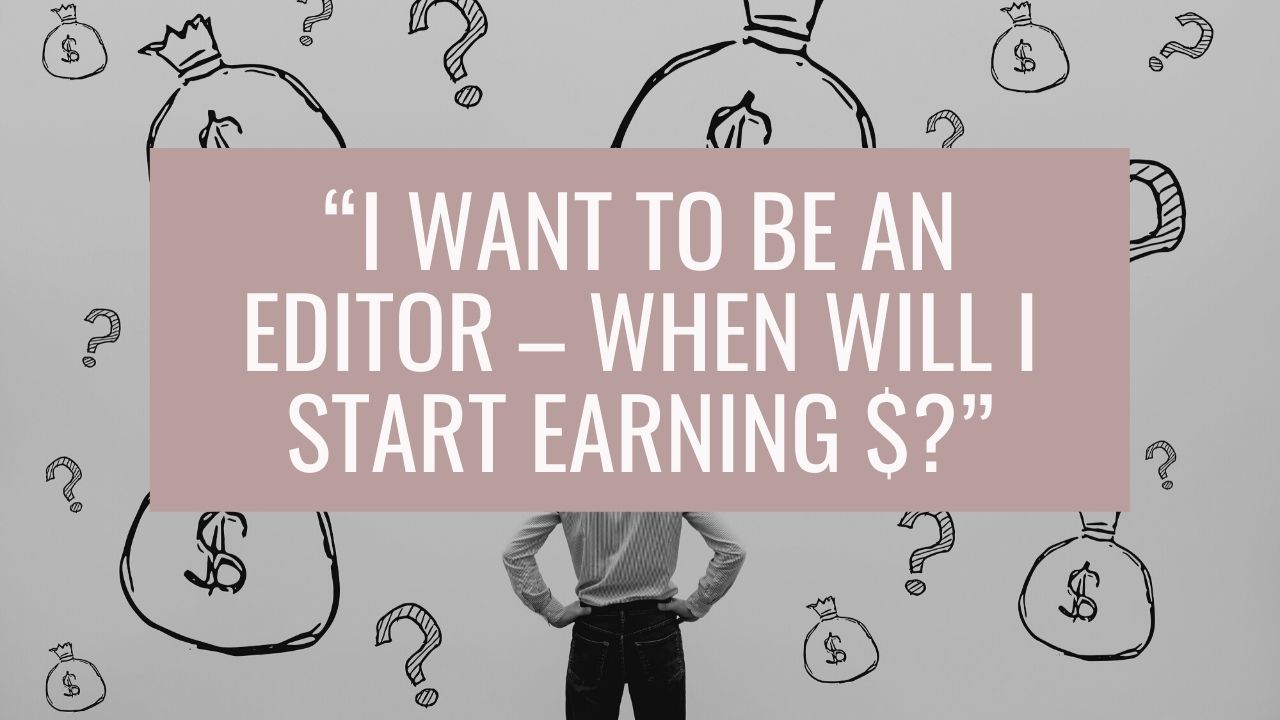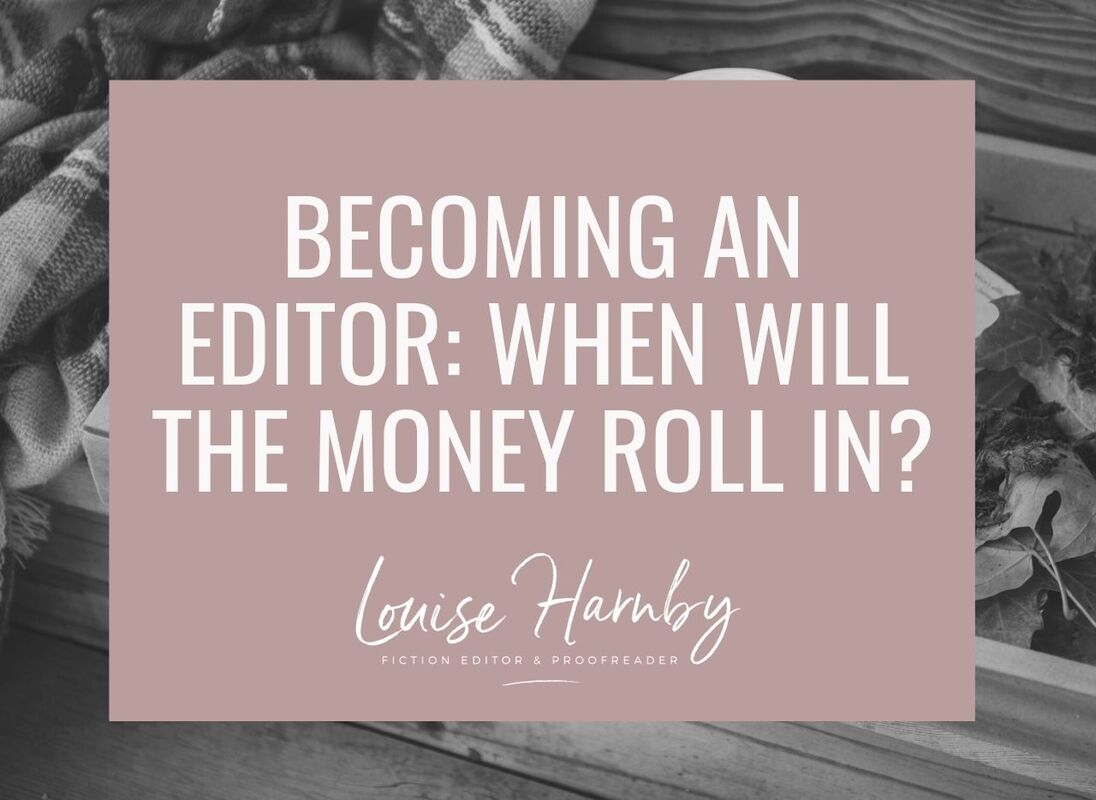|
When will I start earning a decent income from editing? That's a question many new editors and proofreaders want to know the answer to. The fact is this: it depends on many factors.
Difficult questions
It’s not uncommon for established editorial business-owning folk to be asked the above questions (or variations of them). It’s natural that any potential new entrant to the field wants reassurance with regard to the possibilities for “success”. Unless we own a business that provides editorial services for free, has no operating costs, and is owned by someone (us) who has an independent income that pays all our bills, we all need to earn money. However, there’s a problem – all these questions are impossible to answer by anyone other than the person asking the question. I would love to be able to give definitive answers:
But to respond as such would be misleading. However long we’ve been in business, however “successful” our businesses, we can’t know how a new colleague will fare. This is because the following are specific to each and every one of us: A How much we need to earn per month to meet our expenses B How many billable hours a month we have available for work C The customer groups with whom we are best matched D How much our target customers will pay E How much work per month (hours) they will supply us with Ultimately, we all hope to be in a position where D x E is greater than A (though we are limited by B). Getting to this point takes time and effort, so transitioning carefully with realistic expectations, thorough research, sensible planning and an awareness of what needs to be done to run a business will form the backbone of any advice an editorial pro can provide. A: How much money do you need to earn?
Financial viability is less about what you earn than what you need to earn. If Ms Editor earns ten grand a month from her editorial business but her mortgage is triple that, she’s in trouble.
If Mr Proofer earns ten grand a year from his editorial business but he has a large trust fund and a mortgage-free home, courtesy of a wealthy and generous relative, he’s laughing. These are extremes, I know, but the point is that each person’s requirements are unique to their situation.
All these issues and more will affect what you need to earn and therefore what financial figure will mean "success", "sustainability" and "viability" for you. B: How many billable hours a month do you have available?
Returning to the basic equation above, if D (what our customers will pay) multiplied by E (how many hours of work we can secure) only equals A (what we need to earn) when we bill for 40 hours a week, but we only have 20 billable hours a week available, we have a problem.
For example, in my household there is a young child who needs attending to, meaning I have 30 billable hours available. I have to factor that into my planning. Even if you have 50 billable hours available, are you sure you can work those hours? Proofreading and editing require a lot of concentration. There’s a lot of strain on the brain and the eyes. Some people can sustain this level of attention; others struggle. It’s therefore important to be realistic about whether it’s physically feasible to work the hours available. Heed Rich Adin's wise advice:
The usual scenario is that an editor ends the year having worked fewer than an average of 40 hours per week and fewer than 52 weeks during the year.
(The Business of Editing: Why $10 Can’t Make It, An American Editor, 2014) That's worth bearing in mind when doing the arithmetic. Furthermore, running one’s own business means that time has to be made for housekeeping issues that aren't billable – marketing, invoicing, equipment maintenance, troubleshooting, accounting, training, etc. If you have 40 hours you may well need to set aside 5 for your other business-essential tasks, leaving you with only 35 billable hours. Be sure to factor those in to your planning. Rich Adin offers some detailed advice about this on his An American Editor blog: see his posts tagged "effective hourly rate" or "EHR". C: With which customer groups are you best matched?
What services you are offering and to whom? Different client types have different expectations – of what editorial services cost and what they comprise.
An independent author might ask for a proofreader but expect the level of intervention that a copy-editor would provide; they might even need a structural editor (for a summary of these different levels of intervention, download the booklet Which Level of Editing Do You Need? Also worth noting is that a publisher with a set of typeset page proofs will almost certainly define “proofreading” differently from a business client with a Word file. And a biologist looking for an editor to check her journal article prior to submission might require that editor to have a life-sciences knowledge base that the fantasy fiction author certainly won’t. Knowing your customer and how their needs match your skills is important if you are to target effectively. Getting to those customers is key – earning money means finding clients; and finding clients means promoting your business. If you have 35 billable hours available but no clients, you're effectively unemployed. Assuming you are trained and work-ready, you need to be proactive with regard to those promotional activities that are most likely to bring you into contact with your customer. Effective marketing is not only about delivering the message via an appropriate channel, but also about ensuring that the message is on point. This can take a lot of tweaking – making sure that CVs, portfolios, website copy, letters/emails, directory listings, etc. communicate the right message to a particular customer. D and E: How much will your target customers pay and how much work will they will supply?
Even if you've identified appropriate customer groups and worked out how to get their attention, will they pay you what you need to earn? “Editing” is an umbrella term that incorporates a range of functions and a corresponding range of fees
See, for example:
Asking how one goes about getting into “editing”, how much it will pay and how long it will take to earn that money is a little like asking the same questions with regard to hospital work – it depends on whether you want to be an auxiliary nurse, a radiologist, a heart surgeon, an administrator or a cleaner. There are lots of different jobs that pay different rates. Opportunities for one role may come up less often than opportunities for others, and the skills/training required to be work-ready for those roles are different, too. (For guidance about suggested fees, check your national editorial society's guidelines.) You may find that, in the start-up phase of your editorial-business ownership, the clients who are offering you work don’t have enough of it to meet all of your financial requirements, or they have enough work but the rates they are prepared to pay mean that your total monthly earnings don’t match your outgoings. Furthermore, the editorial freelancing market is competitive. Some of your core potential clients may already have the suppliers they need, so even though you have the skills the customer wants, they don't yet have space to take you on. All of these factors mean that building an economically sustainable client base will take time, though exactly how much time will vary depending on whom you speak to. What to do ... asking answerable questions
Here's what to do:
Once you know what you’re spending you know what you need to earn. Now you’re in a position to start thinking about the types of people who will hire your services and how you will get to them.
Join editorial freelancing networks and use these to talk to your colleagues-to-be. In addition to the social media options, most national editorial societies offer opportunities for members to engage with each other. Using these networks, you can explore the following: None of the above will tell you whether their experiences will be the same as yours because you’re starting out now, whereas they were starting out then. Furthermore, your voice is different to their voice, so the way you present yourself will be unique. Still further, not all the online voices will be targeting the same customers as you or even live in the same part of the world as you; advice may be country- or region-specific and therefore not necessarily appropriate to you (though many core business issues are universal). What these discussions will do is guide you towards ideas and activities that can be tested. As Kate Haigh reminds us, when it comes to networking:
The support that we all offer each other is invaluable, not only with work-specific queries but also with ideas for training, ways of dealing with the peaks and troughs of work and, perhaps more importantly, just being there with an understanding ear.
(Best of enemies – the joys of seeing other freelancers as colleagues and not enemies. Find a Proofreader) No established editorial business owner will be able to hand over a ready-made plan that will guarantee a certain level of income in a certain time frame by carrying out a definitive list of activities. However, by doing the in-depth research and planning, you can still make sensible decisions about whether to jack in your full-time job and go freelance straight away, or whether to hold off and transition more gently as you hone your skills, explore your potential customers’ requirements, and build a sense of what work is available and how much income it generates. And don't forget that terms such as “success”, “viability” and “sustainability” mean nothing unless they are framed within the broader and unique context of what each of us requires to thrive. More resources
Louise Harnby is a line editor, copyeditor and proofreader who specializes in working with crime, mystery, suspense and thriller writers.
She is an Advanced Professional Member of the Chartered Institute of Editing and Proofreading (CIEP), a member of ACES, a Partner Member of The Alliance of Independent Authors (ALLi), and co-hosts The Editing Podcast. Visit her business website at Louise Harnby | Fiction Editor & Proofreader, say hello on Twitter at @LouiseHarnby, connect via Facebook and LinkedIn, and check out her books and courses.
4 Comments
26/3/2014 02:38:05 am
Another great post, Louise! And thanks for the shout-out.
Reply
Louise Harnby
26/3/2014 02:50:37 am
Your explanation of the different levels of editing is one of the most digestible I've come across, Sophie (to the extent that I wish I'd written it myself!).
Reply
29/3/2014 04:15:30 am
One of the best blog articles I have read on any blog. Well done, Louise.
Reply
Louise Harnby
29/3/2014 07:31:39 am
Hi Rich.
Reply
Leave a Reply. |
BLOG ALERTSIf you'd like me to email you when a new blog post is available, sign up for blog alerts!
TESTIMONIALSDare Rogers'Louise uses her expertise to hone a story until it's razor sharp, while still allowing the author’s voice to remain dominant.'Jeff Carson'I wholeheartedly recommend her services ... Just don’t hire her when I need her.'J B Turner'Sincere thanks for a beautiful and elegant piece of work. First class.'Ayshe Gemedzhy'What makes her stand out and shine is her ability to immerse herself in your story.'Salt Publishing'A million thanks – your mark-up is perfect, as always.'CATEGORIES
All
ARCHIVES
July 2024
|
|
|
|

















 RSS Feed
RSS Feed





